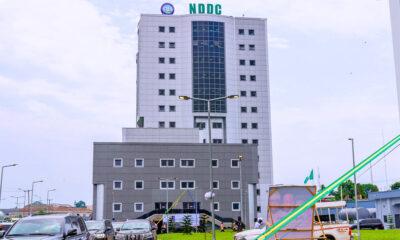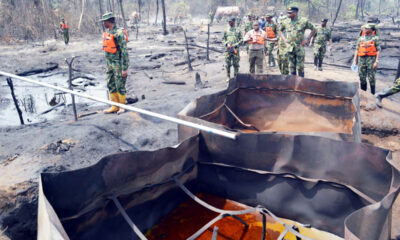metro
Tension in N’Delta as militants threaten to attack oil facilities

A fierce militant group, Niger Delta Avenger, has threatened to attack critical oil and gas facilities in the Niger Delta and major politicians from the region for their roles in the under-development of the area.
The threat is contained in a statement, titled, ‘We are back with Operation Humble’, posted on its site on Saturday.
Niger Delta Avengers, whose activities majorly contributed to the Nigeria’s slide into recession in 2016, said its men had been deplored in strategic locations in the region in preparation for the attack.
The militant group accused the Federal Government of failing to meeting its demands to speed up development of the region since it declared ceasefire, following intervention of leaders and stakeholders from the area.
It vowed to force the country into recession as it did in 2016, noting that Nigeria might not recover from the recession anytime soon.
The statement read in part, “It is disheartening that despite being the economic backbone and having resolved to maintain the peaceful environment for the smooth operations of the oil multinationals whose proceeds the country cling unto for economic survival, the Niger Delta and the South-South remain the most under developed, with our needs and interests undermined by the failed Nigerian state.
“We decided to suspend our famous operation red economy‚ which bled the Nigerian economy into recession about 4 years ago not because we are lazy, but for the love we have for our people and out of respect for the voice of the elders of the Niger Delta region, who beckoned on us to give peace a chance and avail the government time to act on our demands at the time.”
The militant group noted that it decided to resume hostility because its high command has exhausted its patience to allow government speed up the development of the region.
It also passed a vote of no confidence on the Chief Edwin Clark-led Pan Niger Delta Forum (PANDEF), elders and ex-agitators in the region, accusing them of frolicking with the government at the detriment of its people.
The statement read, “In a move to remind this failed government that we have exhausted the very last iota of patience, the High Command of the Niger Delta Avengers have in a meeting held last night resolved as follows:
“We have lost total confidence on all socio-cultural groups like PANDEF, the elders of Niger Delta and the bunch of so-called ex-agitators frolicking with the Government at our detriment.
“This operation shall be coded ‘Operation Humble’‚ aimed at bringing down targeted oil installations in the Niger Delta Region, capable of humbling the economy into permanent recession.
“This mission is also targeted at political actors who are collaborating with the Nigerian Government to undermine the interest of the Niger Delta people.
“There is no doubt that the Nigerian Government has continued to pay deaf ears to our demands and the rising challenges in the country, because the pipelines that criss-cross our lands are left untouched, allowing dollars to flow into the Federal treasury on a daily basis for, mismanagement.
“We shall spare no single oil installation within our range of strategic targets marked for destruction in the coming days and we bet the Nigerian Government will be humbled to return to the drawing board and chart an all-inclusive course by the time we are done with our action plan.
“Members of our strike teams across the Niger Delta are commanded to be on red alert, awaiting precise strike plans as mapped by the high command of the NDA.”
metro
Lagos govt clears traders from rail tracks at Bolade, Oshodi
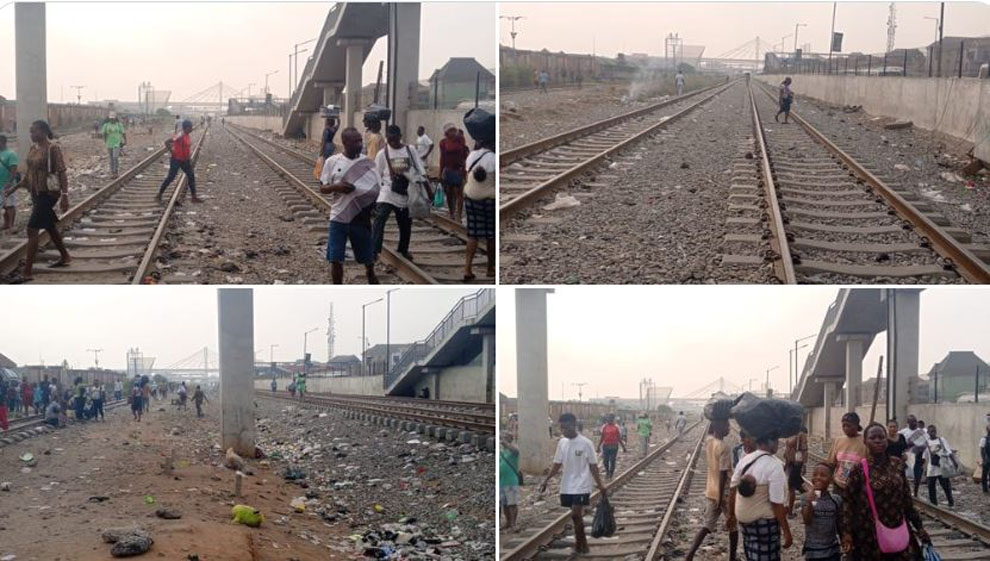
Lagos govt clears traders from rail tracks at Bolade, Oshodi
The Lagos State Government has removed traders operating on the rail tracks at Bolade, Oshodi, following a viral video that raised concerns about public safety.
The announcement was made by Tokunbo Wahab, Lagos State Commissioner for Environment and Water Resources, on Monday.
The clearance was done in collaboration with the Nigerian Army from the nearby Ikeja Cantonment.
Wahab’s statement read: “Following the viral video on social media, we’ve removed traders from the rail tracks at Bolade, opposite Arena Shopping Complex, in collaboration with Nigerian Army personnel from Ikeja Cantonment.”
READ ALSO:
- Four countries that won’t celebrate New Year
- Social media abuzz over Fayose claim of N50m donation to VeryDarkMan’s NGO
- Mexico recovers 31 bodies from secret graves
The viral video, originally shared on X (formerly Twitter) by a user identified as @dipoaina1 on December 28, depicted scenes of buying and selling taking place perilously close to the railway tracks.
The footage showed an NRC train on the Lagos-Ibadan rail track passing by as people continued their activities undeterred. The post highlighted the dangers posed by the lack of barriers, with @dipoaina1 suggesting the railway route be fenced with barbed wire to prevent such risky behavior.
The government’s swift response underscores its commitment to ensuring public safety and maintaining order around critical infrastructure. This move also aligns with broader efforts to address safety challenges associated with urban rail transportation in Lagos. However, the incident highlights the need for sustained proactive measures rather than reactive actions to prevent future occurrences.
Lagos govt clears traders from rail tracks at Bolade, Oshodi
metro
Four countries that won’t celebrate New Year
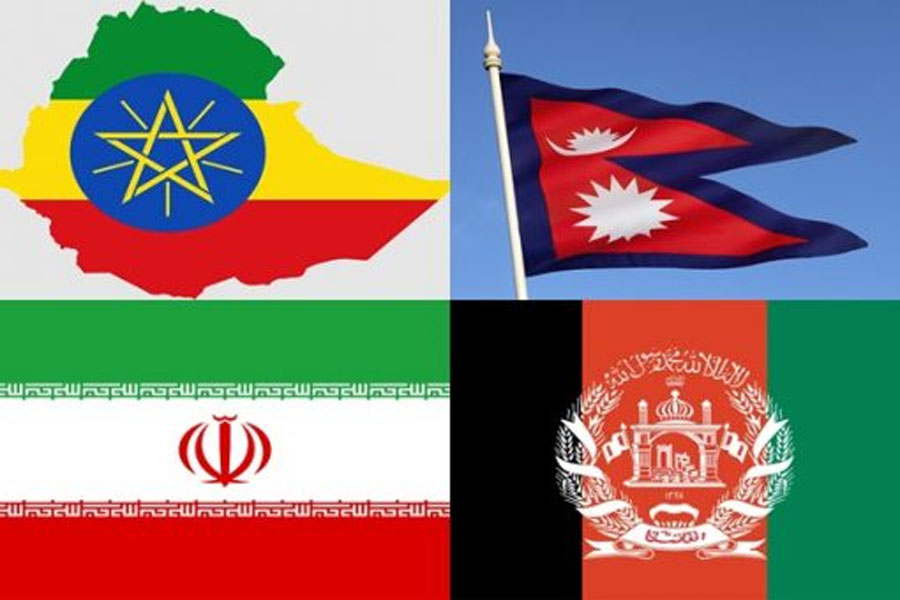
Four countries that won’t celebrate New Year
In less than 12 hours, countries around the world will be celebrating a New Year – 2025.
However, there are some countries that will not join in the celebration as their calendars differ from the rest of the worlds’.
Ethiopia, Nepal, Iran, and Afghanistan are four countries that won’t be celebrating New Year’s Day 2025.
Ethiopia is a land of ancient traditions and unique cultural identities, including its own calendar system. The Ethiopian calendar, based on the Coptic calendar, comprises 13 months—12 of which have 30 days, while the 13th month, Pagumē, has five or six days depending on the leap year.
The Ethiopian New Year, known as Enkutatash, falls on Meskerem 1, which corresponds to September 11 or 12 in the Gregorian calendar. Interestingly, Ethiopia is about seven to eight years behind the Gregorian calendar, meaning that as the rest of the world enters 2025, Ethiopia will still be in 2017.
READ ALSO:
- Social media abuzz over Fayose claim of N50m donation to VeryDarkMan’s NGO
- Mexico recovers 31 bodies from secret graves
- FCT police recover huge firearms from suspect after shooting incident
Nepal embraces two traditional calendar systems—Vikram Samvat and Nepal Sambat—making it one of the most unique timekeeping cultures globally. Vikram Samvat, a lunisolar calendar, is the official calendar of Nepal and is approximately 57 years ahead of the Gregorian calendar.
Additionally, the Nepal Sambat, a lunar calendar, is used by the Newar community and runs on its own timeline, adding another layer of distinction to the nation’s calendar traditions. The official New Year celebration in Nepal, called Bisket Jatra, typically falls in April. Hence, January 1 is not a significant date in Nepal.
Iran follows the Solar Hijri calendar, which is one of the most accurate solar calendars in the world. This system begins with the vernal equinox, marking the first day of spring. The Iranian New Year, known as Nowruz, falls around March 21 and is celebrated with elaborate customs and rituals that date back over 3,000 years.
For Iranians, January 1 is an ordinary winter day, with their focus firmly set on the arrival of spring and the renewal it symbolises.
Afghanistan also uses the Solar Hijri calendar, aligning its timekeeping closely with Iran. Similarly, Nowruz marks the New Year in Afghanistan, celebrated with feasts, family gatherings, and cultural events.
Afghanistan’s rich history and adherence to its traditional calendar reflect its cultural pride and resistance to adopting the Gregorian system, making it one of the few nations where January 1 holds no special significance.
Four countries that won’t celebrate New Year
metro
Social media abuzz over Fayose claim of N50m donation to VeryDarkMan’s NGO
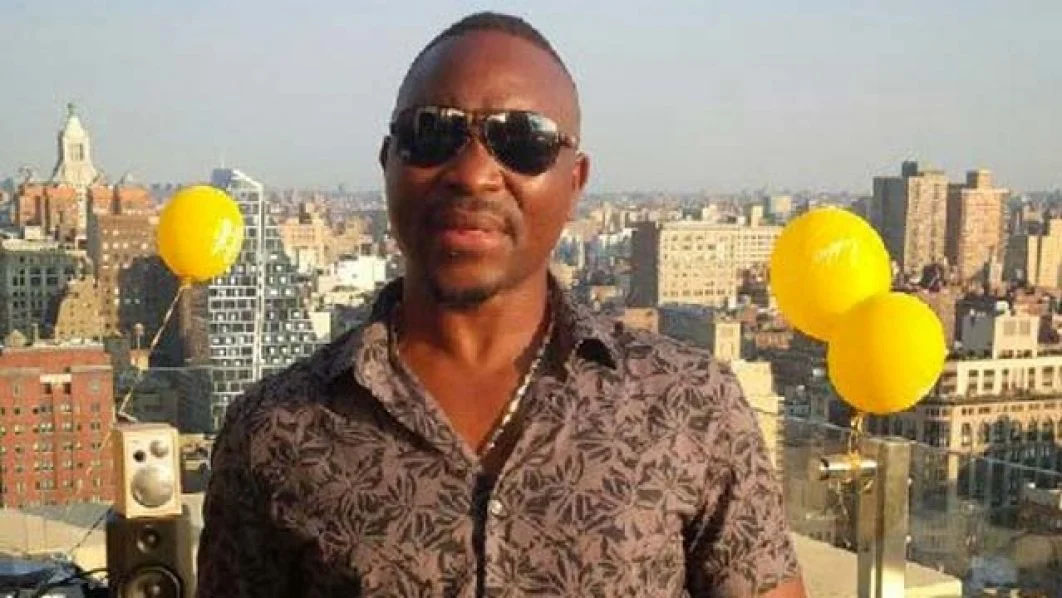
Social media abuzz over Fayose claim of N50m donation to VeryDarkMan’s NGO
Social media was set abuzz on the cusp of the new year when Isaac Fayose, the entrepreneur and younger brother to former Ekiti State Governor Ayo Fayose, claimed he had donated a staggering N50 million to the NGO of popular activist VeryDarkMan.
In a post that blended philanthropy with a touch of mischief, Fayose teased followers with the declaration, describing it as both a “prank” and a “blessing.”
However, the announcement didn’t land smoothly with everyone. While some praised Fayose’s generosity, others demanded proof of the hefty donation.
READ ALSO:
- Mexico recovers 31 bodies from secret graves
- FCT police recover huge firearms from suspect after shooting incident
- Nigeria on life support when Tinubu took office – Akpabio
“Show us the evidence,” a skeptical follower urged, echoing the sentiment of many. “Without proper investigation, it’s wrong to just believe such claims.”
The skepticism grew as other comments poured in. “Send a receipt, even if it’s fake, before we Ekiti people fall for this prank,” one user joked, while another humorously quipped, “Statement of account or no deal!”
Some followers, however, leaned into the fun side of the announcement. A playful comment from one admirer read, “I’m proud of you, baby. I’ll donate my kidney to you!” Meanwhile, others took a more serious tone, questioning why Fayose didn’t spearhead his own initiative instead of supporting another.
Fayose’s post, now a viral topic, continues to draw both laughter and criticism. While the jury is still out on the truth of the donation, one thing remains certain—Isaac Fayose knows how to get people talking.
Social media abuzz over Fayose claim of N50m donation to VeryDarkMan’s NGO
-

 Politics3 days ago
Politics3 days agoGbajabiamila speaks on his rumoured Lagos governorship ambition
-

 metro2 days ago
metro2 days agoFarotimi to pursue disbarment over arrest, defamation allegations
-

 Business2 days ago
Business2 days agoReal reason Dangote, NNPC drop petrol price — IPMAN
-

 Health2 days ago
Health2 days agoABU Teaching Hospital will begin kidney transplant in 2025 – CMD
-

 Sports22 hours ago
Sports22 hours agoAnthony Joshua prostrates before Governor Abiodun during Ogun visit
-
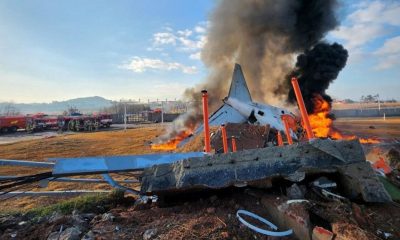
 International3 days ago
International3 days agoBREAKING: Plane skids off runway in South Korea, killing at least 120
-

 metro3 days ago
metro3 days agoEl-Rufai accuses Tinubu govt of Yoruba agenda, Reno Omokri reacts
-

 metro2 days ago
metro2 days agoNigerian govt urged to intervene in Mozambique post-election violence

